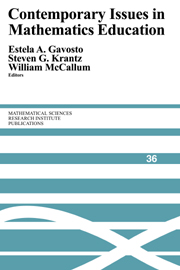Book contents
Research Mathematicians and Research in Mathematics Education
Published online by Cambridge University Press: 27 June 2025
Summary
Members: Hyman Bass (Discussion Leader), Kenneth Bogart, Michael Fried, Cathy Kessell, Alfred Manaster, Steve Monk (Reporter), Blake Peterson
Questions for Day 1
• What interests you particularly about education research?
• What education research have you undertaken or made use of?
• What interactions between education researchers and research mathematicians have you taken part in or have you found particularly worthwhile?
Questions for Day 2
• What specific types of mathematics education research do you recommend as likely to be most useful and accessible to mathematics teachers in the classroom?
• What specific types of mathematics education research do you recommend as likely to be most useful and accessible to those designing mathematics curricula?
Mathematics education research is a field of inquiry into the nature of mathematical learning, as well as into the practice of mathematics teaching. It provides a foundation and methods for designing diverse teaching strategies and for studying their effects. The study of mathematical learning investigates the process by which students give meaning to and learn to employ mathematical ideas and practices, by making connections with and updating their prior knowledge and experience. Such investigations not only provide basic knowledge essential to the development of curricula and materials, but can significantly inform teaching practice as well.
It is vitally important for the mathematics research community to become better acquainted with the field of mathematics education research, with the many insights and perspectives on student learning it affords, and with the applications to practice it suggests. Actions should be taken in this direction by individuals as well as professional societies and institutions.
Information
- Type
- Chapter
- Information
- Contemporary Issues in Mathematics Education , pp. 170 - 172Publisher: Cambridge University PressPrint publication year: 1999
